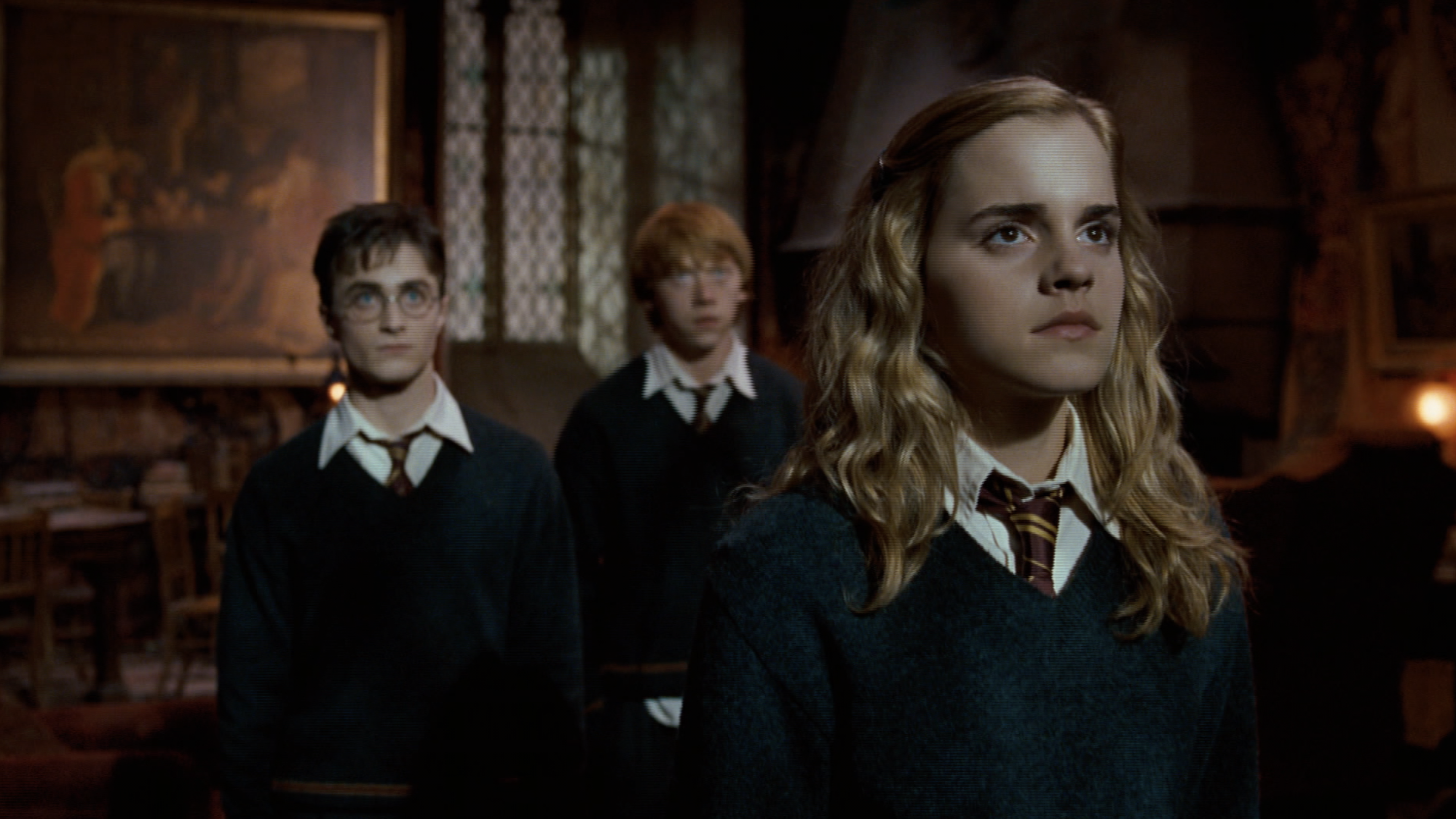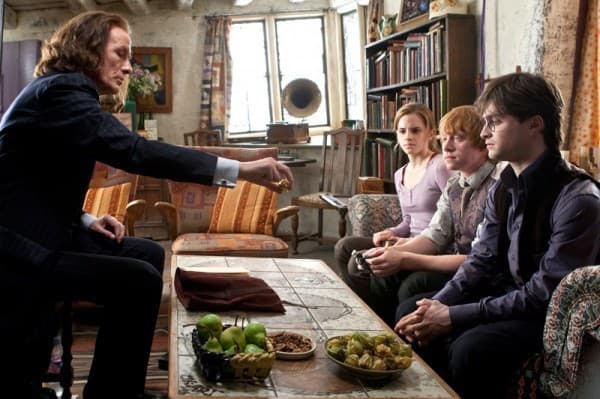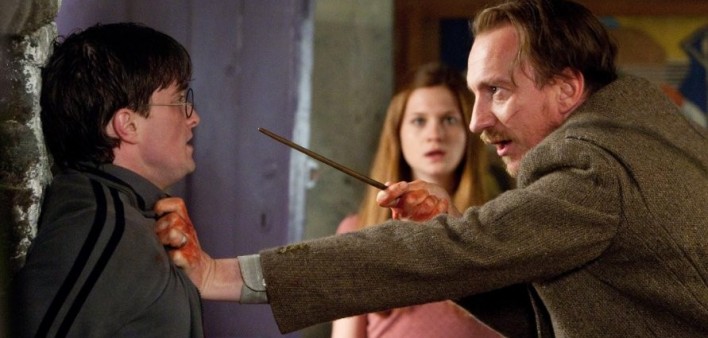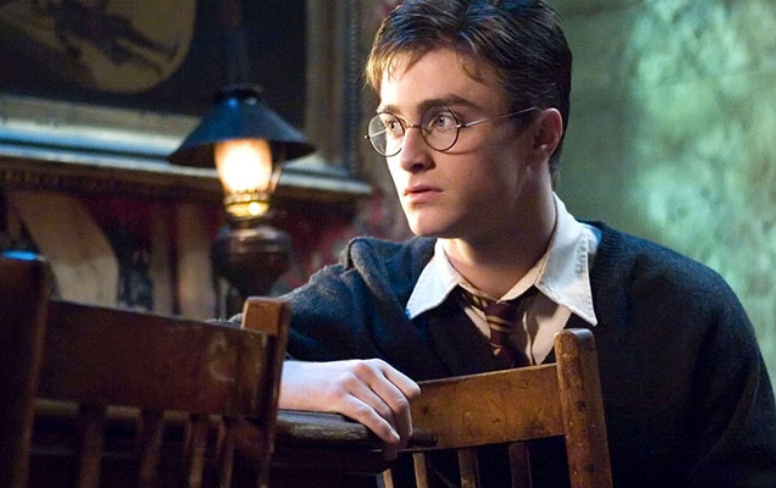Book-Harry Confronts His Friends and His Foes
December 15, 2019—In Episode 10, Victoria and I delved deep into Harry Potter’s character, including how he was a different person in the books than he was in the movies. We spoke vaguely about important character moments that were omitted from the movies, and it’s time to show our work on that. Here are some of the biggest moments of insight, growth, and passion in Harry Potter’s character that were overlooked in the films.
Arguments with Ron and Hermione in Order of the Phoenix
Noone can argue that Harry wasn’t angry, angsty, and overly sensitive in Book 5 and Movie 5. And the filmmakers did dedicate screen time to the resulting strained relationships with his friends. But while in the movies these are fleeting moments of tense non-communication and misunderstanding, in the books, Harry unloads on Ron and Hermione about everything he’s dealing with.
Witnessing Cedric’s death and the resulting survivor’s guilt. His feelings of isolation while staying alone in the Muggle world. His view of himself as an unremarkable but lucky person, not a hero worthy of admiration… All of it comes spilling out in two particular angry rants, the first when he’s initially rescued from the Dursleys and the second when Ron and Hermione propose he teach them Defense Against the Dark Arts (an idea which eventually becomes Dumbledore’s Army).
“. . . [L]ike you can think straight when you know you’re about a second from being murdered, or tortured, or watching your friends die — they’ve never taught us that in their classes, what it’s like to deal with things like that — and you two sit there acting like I’m a clever little boy to be standing here, alive, like Diggory was stupid, like he messed up . . .”

Confrontation with Dumbledore
Movie-Harry’s interactions with Dumbledore almost always carry the same tone—that of a wise old teacher bestowing deep knowledge on an attentive student. While Book-Harry and Dumbledore do have plenty of these moments, their relationship is actually quite tumultuous at times as well.
This is never more evident than at the end of Order of the Phoenix just after Sirius’s death. Harry raises his voice to his Headmaster for the first (though not only) time and actually physically destroys some of his office in a very raw fit of grief, pain, guilt, and blame. While we’ve seen Harry take his anger out his friends before, this is much deeper and cuts to the heart of Harry’s mentality in a way that we never see in the movies.
“Harry, suffering like this proves you are still a man! This pain is part of being human–”
‘THEN — I — DON’T — WANT — TO — BE — HUMAN!” Harry roared . . . “I DON’T CARE! I’VE HAD ENOUGH, I’VE SEEN ENOUGH, I WANT OUT, I WANT IT TO END, I DON’T CARE ANYMORE —.”
Arguments with Scrimgeour
Harry Potter is a fabulously famous and relatively unprotected underage wizard, so it’s hardly a surprise that people try to take advantage of him. When Harry meets Rita Skeeter, he’s too young and green to really know how to handle her. But by the time Rufus Scrimgeour shows up in Half-Blood Prince, Harry’s a bit older and much wiser.

Harry speaks with this particular Minister for Magic exactly three times in the books, none of which are pleasant and all of which follow the same theme: Scrimgeour tries to manipulate and exploit Harry, and Harry’s having none of it.
Scrimgeour repeatedly tries to turn Harry into a governmental pawn, but Harry sees through the politician-speak and firmly denies him. He also refuses to divulge any information about Dumbledore’s movements when questioned and criticizes the Minister’s wartime policies.
“You never get it right, you people, do you? Either we’ve got Fudge, pretending everything’s lovely while people get murdered right under his nose, or we’ve got you, chucking the wrong people into jail and trying to pretend you’ve got the Chosen One working for you!”
Confrontation with Remus
Harry’s tragic childhood shapes his character in a multitude of ways, but perhaps the most overlooked consequence of his past is his views on parenting. Unsurprisingly, given that he’s all of 17 when the series ends, it’s not a topic that comes up much.
But in the books, we do get some insight into his thoughts on the matter when Remus Lupin asks to accompany Harry on his quest to end Voldemort in Deathly Hallow. Harry’s tempted, until Remus reveals that his wife is pregnant and that he intends to abandon her and his child to go with Harry.
In the ensuing screaming match, both of them reference James Potter, and Harry holds him up as an example of how a father should stand by and protect his family. It ends with Harry calling Remus a coward and Remus blasting Harry against the wall in a rare instance of an ally assaulting the Boy Who Lived.
“Parents,” said Harry, “shouldn’t leave their kids unless — unless they’ve got to.”

Final Battle with Voldemort
It may have come up once or twice on the podcast that I’m not a fan of how the filmmakers portrayed Voldemort’s death. (And, full disclosure, it’ll probably come up again… It really bugs me.) I could write an entire post on all the failures of that particular scene, but I’ll limit myself to the matter at hand.
At the end of Book 7, Harry and Voldemort engage in an extended conversation before the final spells are flung, with Harry doing most of the talking and generally showcasing how much he’s matured.
His tone is confrontational, almost mocking, without being angry or reactionary—no matter how much he’s goaded, and Voldemort takes some pretty cheap shots at Lily Potter and at Harry himself. In fact, he comes across as downright cerebral as he lays out all the reasons that Voldemort’s about to lose. And then, he proceeds to prove his point.
“You don’t learn from your mistakes, Riddle, do you?”
“You dare —”
“Yes, I dare,” said Harry. “I know things you don’t know, Tom Riddle. I know lots of important things that you don’t. Want to hear some, before you make another big mistake?”

